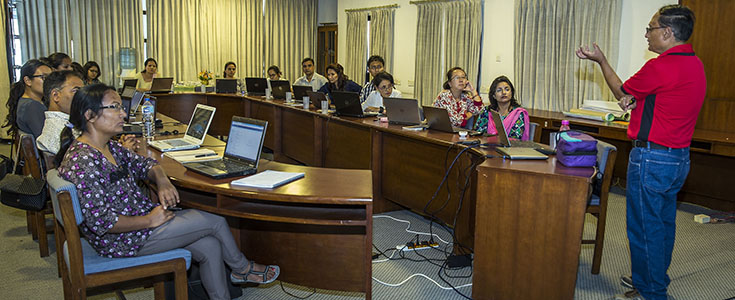The Jordan College of Agricultural Sciences and Technology

Shrestha Uses Weed Research to Build Bridge to Nepal
Fresno State plant science professor Dr. Anil Shrestha is one of the university’s most accomplished and recognized faculty members not only on campus, but also in his homeland Nepal where he volunteers in various activities in training researchers and students in weed science research and education and agricultural experimentation design and data analysis.
Since arriving on campus in 2008, Shrestha has shared his knowledge with Fresno State students through weed and pest management classes and undergraduate student research, and growers and pest control advisors by speaking at various conferences and grower meetings.
Shrestha worked with University of California’s Statewide Integrated Pest Management program for six years before joining Fresno State. He has focused most of his research on herbicide resistance management, organic weed management, weed biology and ecology, and conservation agriculture. He continues to have collaborative projects with UC Cooperative Extension and UC Davis farm advisors and researchers.
He has also shared similar expertise in trips each summer to his native country of Nepal since 2013 through USAID/Winrock International’s Farmer to Farmer Program, and worked with government organizations and university faculty and students.
In the summer of 2018, he created a training workshop for the Nepal Agricultural Research Council (NARC) on agricultural experimental design and data analysis to enhance the research capabilities of the young scientists of NARC.
While there, he also worked with the Wildlife Conservation Nepal (WCN) in which he is starting a five-year term on its executive board and will also train students on research proposal and scientific writing.
In 2017, his trip expanded to nearly seven months with a fall sabbatical that encompassed work for the International Center for Integrated Mountain Development (ICIMOD) organization in Kathmandu.
Among his many projects, he focused on creating the first Invasive National Weed Species Awareness Day in Nepal in collaboration with ICIMOD and Tribhuvan University’s Natural History Museum that included a symposium for researchers, university faculty and students.
“Nepal is seeing a trend toward the redevelopment of many agricultural practices and areas and is looking for outside guidance from international agencies and experts,” Shrestha said. “In recent years, migration of people from agriculture to other enterprises seems to be causing an increase in pesticide use. In particular, use of herbicides for weed management seems to be increasing because of the lack of labor for physical weed control. My knowledge can help maintain safe and effective use of pesticides and prevent environmental and herbicide resistance issues, which many other countries are experiencing."
In prior years, he also collaborated with international institutions such as CIMYYT and IRRI on weed management in wheat, rice and other cereal cropping systems.
For his volunteer efforts he received the President’s Volunteer Service Silver Award twice (2015 and 2017) – one of the nation’s top volunteer honors - for his efforts that are also part of the USAID/Winrock International's Farmer to Farmer volunteer program.
He has also received the Weed Science Society of America’s Outstanding Teacher national award, American Society of Agronomy fellow honor and Fresno State’s Award for Excellence in Teaching. The California Weed Science Society also presented him with an ‘Award of Excellence’ for his significant contribution to weed science research and education in California.
His mentorship and encouragement of students is also encouraging Fresno State plant science students towards productive research careers.
Of the eight graduate students he has mentored so far, two are assistant professors at Oregon State University and Tribhuvan University, Nepal, one is a California Department of Food and Agriculture biological scientist, one is a farm advisor and another a research associate with the University of California, two are working with the crop protection industry as experts, and one is a Ph.D. candidate at the University of Wyoming. Two of these students have been the University President’s Graduate Medalist and four of them Jordan College Dean’s Graduate Medalists. Several of his undergraduate student mentees have won awards for their presentations at various conferences and have gone on to graduate school.
Shrestha says he also feels privileged to have had the opportunity to mentor some students from Nepal in the plant science department.
Senior Samikshya Budhathoki is currently assisting Shrestha with herbicide resistance research at Fresno State to combat weeds that are threatening several cropping systems and non-crop areas in the U.S., including California. She has also gained valuable related experience as a Bayer Crop Science area field station intern working with nematode, weed and entomology research and irrigation systems. She hopes to use all of this valuable experience to potentially pursue a graduate degree in plant or environmental science, and later return to Nepal to help farmers utilize more efficient agricultural and water use practices.
Another former Fresno State plant science student from Nepal, Rama Paudel, received Fresno State’s distinguished international student service award at campus commencement in 2015. Since she received her master’s degree, she has taught agronomy & crop production classes at Tribhuvan University in cereal, oil seed, grain, & legume crops & organic agriculture. This fall she will return to the United States start a doctoral degree at the University of Illinois, Urbana-Champaign with an emphasis on integrated weed management, herbicide & cover crop interaction.
For Shrestha, the connection to these students and his homeland inspires even more pride.
"It's an honor to be able to share my knowledge," Shrestha said, "and to be able to teach and train faculty and young scientists how to conduct research, analyze data and write reports, especially in the country of my origin, is something that is extra special. There's a thirst for knowledge both there and here, and I'm excited by the fact I'm constantly receiving more requests for workshops when I return there. I hope I can extend this relationship far into the future and help other faculty at Fresno State develop similar connections in Nepal."